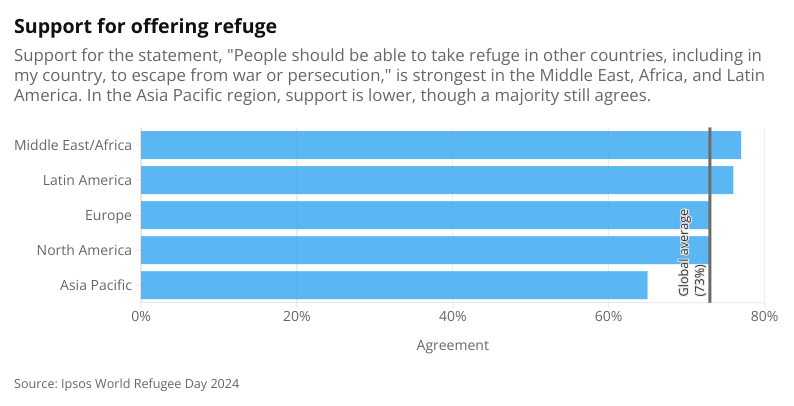The right policy can foster social cohesion between host communities and forcibly displaced people
While we often hear about the economic opportunities and challenges that come with displacement, of equal importance is the social environment that forcibly displaced people inhabit. Social cohesion, or the strength of relationships and the sense of solidarity among members of a community, is necessary to this environment, to allow people from different communities to live together and thrive.
A survey launched in June this year shows that there is widespread support for refugees’ right to seek safety. The survey, on attitudes towards refugees, was conducted across 52 countries and revealed that on a global country average almost 75 percent of adults surveyed believe that those fleeing war or persecution should be able to seek safety in other countries. Yet, the findings of the survey, conducted by Ipsos – one of the world’s leading market research companies – and UNHCR paints a complex picture of perceptions of refugees across the globe, with significant differences in opinion depending upon location and the specific topic surveyed.

However, the right policies can help shape public perception and attitudes thereby contributing to social cohesion. There is evidence to support this, including in a paper by Emily Myers, Audrey Sacks, Juan F. Tellez, and Erik Wibbels in this month’s Literature Review.
Internally displaced people in Mozambique
Research shows that this is as true for refugees as it is for internally displaced people (IDPs). At the 3rd Research Conference on Forced Displacement last month, Henrique Pita-Barros, Assistant Professor at the Department of Economics, Lisbon School of Economics & Management, presented findings from a study in Pemba, Mozambique that asked if ‘community based intergroup interactions reduce the prejudice against IDPs?’ He found that community meetings including IDPs and hosts improved the social integration of those displaced. He concluded that this kind of program has the potential to generate positive, long-lasting effects.
Refugees in Ethiopia and Kenya
Ethiopia has adopted progressive refugee policies and the country’s 2019 Refugee Proclamation grants refugees the right to basic services, work, and freedom of movement. The Socio-Economic Survey of Refugees in Ethiopia (SESRE), released in June this year, can inform policy by providing comprehensive data on the socioeconomic dimensions of refugees and host. The SESRE found that hosts display a generally positive attitude towards refugees and that cultural and linguistic proximity and perception of improvement in local infrastructure are related to this.
The influence of local conditions on social cohesion also emerges in a recent World Bank report on the welfare of refugees and host communities in Kenya, another country which is investing in improving the living conditions of those forcibly displaced. The evidence presented shows how perceptions of trust between those forcibly displaced and their hosts vary considerably across different counties and in different settings. The report also highlights how among refugees, having more Kenyan friends is associated with higher perception of trust towards hosts. Similarly, for hosts, having more refugee friends enhances their trust in refugees. These perceptions can contribute to the development of a more cohesive and collaborative community.
Venezuelans in Exile
Some of the most enduring lessons about social cohesion have come from Venezuelans in exile. In March 2023, more than 6 million lived in the Latin American and the Caribbean (LAC) region outside their own country. The report Venezuelans in Chile, Colombia, Ecuador and Peru, released in February this year, found that social inclusion and the participation in host countries’ labor markets can mitigate issues and unlock the benefits of migration and displacement.
The research on this topic is extensive, and so the JDC — together with the Building the Evidence on Forced Displacement Research Program — has produced a training module on social cohesion that was launched at the end of last year, as part of an online training program on Forced Displacement.
The benefits of strong social ties have been revealed by studies of many other populations, so it should come as no surprise that this is also true for forcibly displaced people. What these people often need, though, is a policy environment that stimulates and supports social cohesion, for the benefit of all affected communities.

Aissatou Maisha Dicko
Head of the World Bank-UNHCR Joint Data Center on Forced Displacement


